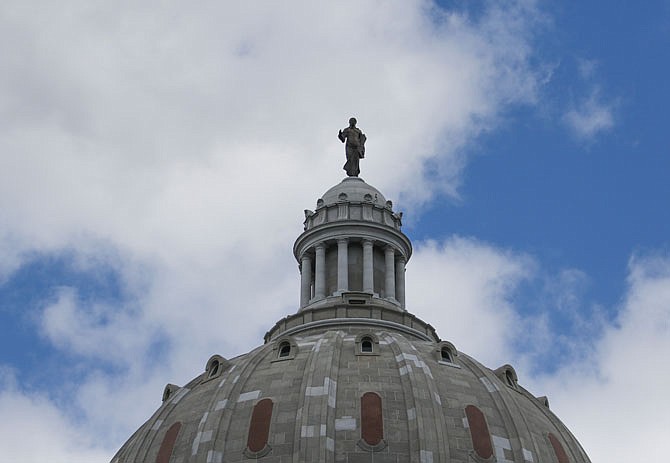There are too many COVID-19 cases among members and staff for the Missouri Senate to do work before Thanksgiving related to the special legislative session underway, Senate leadership said Monday.
A spokesman for the Republican majority in the Senate said, however, there's still time left before a delay would jeopardize the more than $1 billion supplemental budget that's before the Senate - almost all of it to fund the ongoing emergency response to the pandemic.
The pandemic has also caused the state House of Representatives to postpone a two-week statewide bus tour for newly elected House members.
In the Senate, President Pro Tem Dave Schatz, R-Sullivan, and Majority Floor Leader Caleb Rowden, R-Columbia, said in a statement Monday: "Due to a number of positive COVID-19 cases among members and staff, the Missouri Senate will postpone action related to the extra legislative session until after the Thanksgiving holiday. This decision was not made lightly and, although disruptive, is in the best interest of protecting members, staff and the public."
Lawmakers are working to pass a supplemental budget of $1.2 billion and answer Gov. Mike Parson's later call to pass COVID-19 liability protections for hospitals, businesses and other organizations.
The House passed the supplemental budget last week, sending it to the Senate, and a liability protections bill was introduced in the Senate on Friday.
"I am aware of one senator and one staff member who have tested positive over the weekend. I'm not in a position to divulge their names, but I don't believe either had been in the Capitol in days leading up to their diagnoses over the weekend," said Stuart Murray, Senate majority caucus communications director.
Seth Bundy, Senate Democrats' communications director, said: "To my knowledge, no Democratic members are among the positive cases in the Senate."
The federal Coronavirus Aid, Relief and Economic Security Act funding contained in the supplemental budget has a Dec. 30 deadline to be spent.
"We believe passing a supplemental budget within the first two weeks of December will provide Gov. Parson the flexibility and spending authority he needs," Murray said.
The News Tribune did not immediately receive a response Monday from Parson's office or State Budget Director Dan Haug regarding whether there's a date after which there would be concerns about having enough time for CARES Act money to be spent.
House Chief Clerk Dana Rademann Miller did not have a count of how many representatives or staff have COVID-19, but said, "It is safe to say that a number of members and staff have tested positive for the virus and have taken the appropriate steps to quarantine and self-isolate."
House Majority Floor Leader and next-designated Speaker of the House Rob Vescovo, R-Arnold, said in a statement Monday: "Out of an abundance of caution and in an effort to protect the health and well-being of members, staff and the general public, we have decided to postpone the two-week statewide bus tour for newly elected House members."
The St. Louis Post-Dispatch reported last week there was to have been a masks-optional bus.
Vescovo added, "The tour is an incredibly important learning opportunity that gives new members first-hand experiences with many of the programs and facilities around the state that are impacted by their decisions in Jefferson City. I am committed to ensuring our new members will be able to benefit from this incredible educational experience at a future date when we can conduct the tour in a safe and responsible fashion that doesn't risk further spread of COVID-19."
Tour dates are being considered for next summer, but there won't be a final decision "until the health and well-being of tour participants and the general public can be adequately protected."
Orientation for new House members continues this week at the Capitol, with precautions.
At least one of several House and Senate joint committee hearings that had been scheduled for Thursday was canceled Monday.
Nathan Elwood, administrator of the Missouri Legislative Library at the Capitol, said Monday the library's research showed another disease has never before delayed a legislative session.
The General Assembly met biannually at the time of the 1918 influenza pandemic, so there was no session that year to be interrupted, Elwood said.
A better parallel to the present-day's pandemic and its effects on the State Capitol would be a 1907 epidemic of smallpox at the Capitol, he said.
The first case then of the highly infectious and deadly disease - since eradicated - was recorded in Jefferson City on Feb. 5, 1907, according to newspaper reports at the time. By the end of the month, there were dozens of cases in the city, some lawmakers had fled the Capitol and the city went into lockdown.
Legislative session continued, but with interruptions of normal business and health restrictions on public access at the Capitol similar to the present - infections among lawmakers and staff, closed or limited gallery seating, temperature checks, abandonment of handshakes.
Infections among some key lawmakers behind a racist "Jim Crow" segregation bill being considered at the time were part of the reason that bill was defeated.
The lockdown and mass use of an already-available vaccine - which reportedly became mandatory to receive at the Capitol - were credited with leading to the smallpox epidemic being declared under control in Jefferson City exactly a month after the first case in the city.
This article was updated at 4:15 p.m. Nov. 16, 2020, with additional details.

